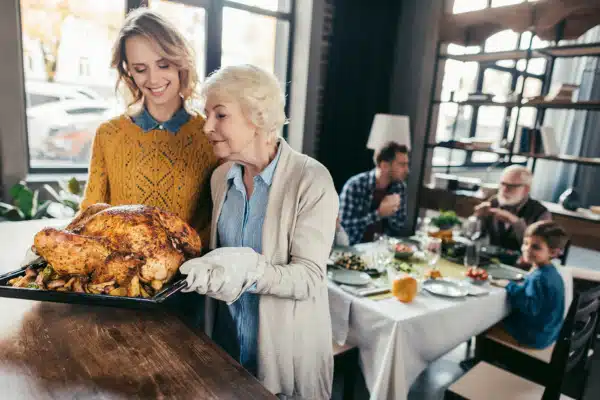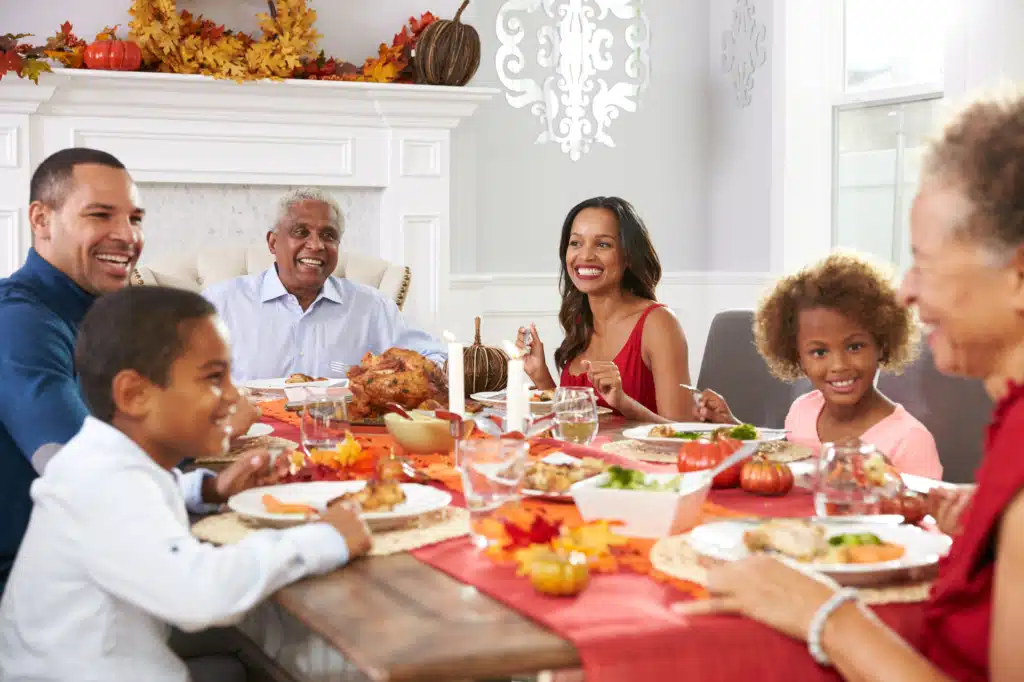 go back
go back
 go back
go back
celebrate worry-free
The holidays are a time for family, friends, and social gatherings. But for those with allergies, it can often be the season for suffering and anxiety about hidden allergy triggers.
Allergies in the United States are very common. The Allergy and Asthma Foundation of America reports that 50 million people experience various types of allergies each year. And over the holidays, allergies can flare as people find themselves in new environments, with new foods, and different holiday decor.
Whether you’re preparing your home or getting ready to host, here’s what you can do to keep your holidays happy AND healthy.
What Hidden Allergies Should I Be Aware Of During The Holidays?
The potential for hidden allergies may not be on the top of your mind when preparing to decorate your home for the holidays, but some of the most popular home decor items can be a potential trigger for allergy sufferers. According to the American College of Allergy, Asthma, and Immunology (ACAAI), there are several common holiday items that you should be aware can cause allergic reactions – scented candles, wood burning fireplaces, trees, and wreaths.
The ACAAI suggests replacing scented candles and wood-burning fireplaces with flameless candles or electric fireplaces, which provide the same effect without the irritating scents and smoke. When it comes to live trees and wreaths, make sure to rinse them off and allow them to thoroughly air-dry before bringing them inside to avoid sap, mold spores, and pollen. Even if you go the artificial route, thoroughly clean your tree to remove any dust or mold that has accumulated over the last year.

Related Content: Preparation Tips for Those with Allergies
When you have food allergies, it’s not as simple as just saying “yes” when someone invites you to dinner. You need to tell your host that you or someone in your family has a food allergy, the key thing is to do so in a polite way.
Read Blog PostHow can I be considerate of Guests With Allergies?
First and foremost, make sure your home undergoes a thorough cleaning a day or two prior to your guests’ arrival. Dust, mold, pet fur, and dander are common allergens. If you do have a pet, make sure your guests are aware prior to arriving so they can take or bring any necessary medication.
Giving your pet a good wash prior to visitors may help remove some of their dander, plus using central HVAC filters with a MERV rating of 17 or higher will help filter airborne allergens. Additionally, ensure your HVAC filters have been recently changed. Finally, running the air conditioner will decrease the humidity of your home; humidity levels of 50% or less will help decrease the dust mite and mold levels in your home.
Guests with food allergies need extra care to make sure they don’t get sick.
The Allergy and Asthma Foundation of America (AAFA) says that 32 million Americans have food allergies. If you don’t know whether or not any of your visitors has a food allergy, the easiest thing to do is ask! For your guests with food allergies, also ask for recommendations on safe food alternatives.

Some basic rules to follow when cooking for people with food allergies are:
- Read food labels every time you buy a product. Make sure there are no hidden ingredients that could cause an allergic reaction. These include the nine foods that cause most reactions – milk, soy, eggs, wheat, peanuts, tree nuts, sesame, fish and shellfish – even in small amounts.
- Prepare and serve safe food with separate, clean utensils and safe surfaces. Always make food for your guests with allergies first to reduce the chance of cross contamination. Mark safe foods by putting them in different-colored containers or using different-colored serving tools.
- Wash your hands with soap and water before handling food.
And don’t be offended if your guests choose to bring their own food! Many allergy sufferers, especially those with more severe allergies, may choose to prioritize their health by preparing and eating food they brought themselves, that way they can enjoy the event while ensuring they avoid any accidental cross-contamination or allergic reactions.
How do I handle an Allergic Reaction
Even the most prepared and proactive hosts can still have a guest that suffers an allergic reaction. There are many people who are unaware they are allergic to something until they come into contact with it for the first time. As a host, it’s important to recognize the signs of an allergic reaction so that you can best help your guest.
Symptoms of an allergic reaction can include hives or a rash, chest tightness, trouble breathing or vomiting. It is important to recognize these symptoms and act quickly. For those guests who have known food allergies and experience these symptoms, inquire what their prescribed plan of action is and assist as needed. If your guest has not had previous reactions but is having any of the above in association with eating, it is best to seek medical care immediately.

Medically Reviewed By: Amy Parker, MD
Reviewed on: Nov. 14, 2022
Our team of writers, editors, and medical experts goes over each article carefully to make sure the information is correct and that only reliable sources are used.
We regularly check to see if the info in this article matches up with the latest scientific research and expert advice so that we can give you the most up-to-date information. See list of trusted resources here.
Get Help Managing Your Allergies
Allergies can dull the fun and merriment of the holidays. But it doesn’t have to be that way. With many convenient locations across the country, we have a specialist who can help you manage your allergies and help ensure you have a safe and happy holiday season.
Make an Appointment